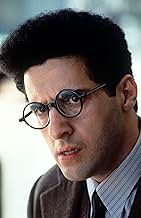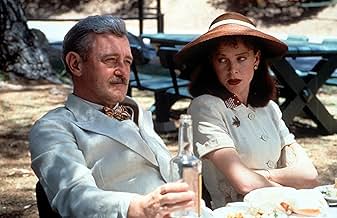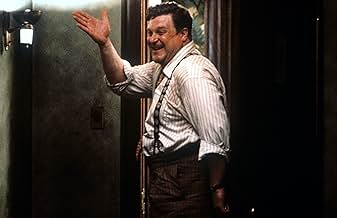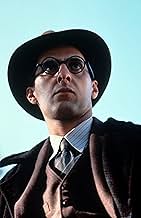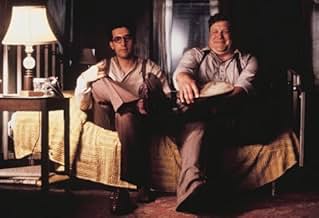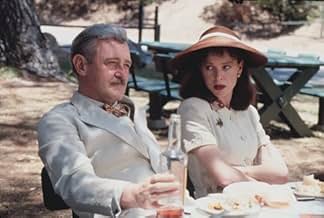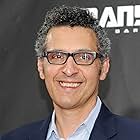A renowned New York playwright is enticed to California to write for the movies and discovers the hellish truth of Hollywood.A renowned New York playwright is enticed to California to write for the movies and discovers the hellish truth of Hollywood.A renowned New York playwright is enticed to California to write for the movies and discovers the hellish truth of Hollywood.
- Nominated for 3 Oscars
- 19 wins & 29 nominations total
Meagen Fay
- Poppy Carnahan
- (as Megan Faye)
- Directors
- Writers
- All cast & crew
- Production, box office & more at IMDbPro
Featured reviews
You are either going to love or hate this one, and I doubt you'll know which until it's over. Maybe you won't know even then.
In 1941, Barton Fink (John Turturro) is a successful Broadway playwright. Now that he's got some success under his belt, he says he wants to write plays for "the common man". But his agent has a tempting offer. A movie studio wants him to come to LA and write screenplays for 1000 dollars a week. The agent convinces him to go. Barton checks into the Hotel Earle, which has ornate decorations in the common areas, but is a dump from the standpoint of Barton's room. The heat has the wallpaper peeling off the walls. The sole decoration in Barton's room is the picture of a woman sitting on the beach, her arm raised to block the sun. Remember this picture - it's important.
Barton's first assignment is to write a "wrestling picture" starring Wally Beery. But Barton has writer's block for assorted reasons, one of them being that he knows nothing about this subject. So he stares at his typewriter with the dread an insomniac might stare at his bed. But then what seemed to start out being a film about how the studio system can beat the creativity and the confidence out of a successful writer changes course and becomes something that is completely surreal and even nightmarish by the end. I can really say nothing more specific than that without giving things away.
The Coens wrote Barton Fink when they were having writer's block trying to write Miller's Crossing because of the complexity of the plot. So did they manage to pack lots of symbolism into a tight, coherent package, or did they simply let their imagination run wild and undisciplined in an attempt to get back on track on the other film? I have no idea. I just know that I like it and - for me - it's great for repeat viewings.
One more thing - How can it be so hot in LA, and then suddenly WWII has started, which would make it December? Why is it Barton doesn't seem to notice WWII has started without being told and then really has no reaction. He really isn't plugged into "the common man" is he?
In 1941, Barton Fink (John Turturro) is a successful Broadway playwright. Now that he's got some success under his belt, he says he wants to write plays for "the common man". But his agent has a tempting offer. A movie studio wants him to come to LA and write screenplays for 1000 dollars a week. The agent convinces him to go. Barton checks into the Hotel Earle, which has ornate decorations in the common areas, but is a dump from the standpoint of Barton's room. The heat has the wallpaper peeling off the walls. The sole decoration in Barton's room is the picture of a woman sitting on the beach, her arm raised to block the sun. Remember this picture - it's important.
Barton's first assignment is to write a "wrestling picture" starring Wally Beery. But Barton has writer's block for assorted reasons, one of them being that he knows nothing about this subject. So he stares at his typewriter with the dread an insomniac might stare at his bed. But then what seemed to start out being a film about how the studio system can beat the creativity and the confidence out of a successful writer changes course and becomes something that is completely surreal and even nightmarish by the end. I can really say nothing more specific than that without giving things away.
The Coens wrote Barton Fink when they were having writer's block trying to write Miller's Crossing because of the complexity of the plot. So did they manage to pack lots of symbolism into a tight, coherent package, or did they simply let their imagination run wild and undisciplined in an attempt to get back on track on the other film? I have no idea. I just know that I like it and - for me - it's great for repeat viewings.
One more thing - How can it be so hot in LA, and then suddenly WWII has started, which would make it December? Why is it Barton doesn't seem to notice WWII has started without being told and then really has no reaction. He really isn't plugged into "the common man" is he?
While many of us know "Fargo" and "Big Lebowski", many fans still haven't heard of "Barton Fink", which is too bad. This is probably John Turturro's best role (and his least weird). Tony Shalhoub also gives an outstanding performance (at least as good as he was in "The Siege").
John Goodman? Heck, even he is pretty good here and I'm not a big fan of his (though the Coen Brothers do him justice like no others can). His portrayal of the questionable neighbor just really suits him.
There is supposed to be deep symbolism in this film -- some say it's an allegory for the rise of Nazism (and I can see that), while others say it's just a critique of Hollywood. I don't know. But, you know what? No matter what it's about, it's beautiful in a nihilistic way... and you will want to know: what's in the box? And I'm not going to tell you.
John Goodman? Heck, even he is pretty good here and I'm not a big fan of his (though the Coen Brothers do him justice like no others can). His portrayal of the questionable neighbor just really suits him.
There is supposed to be deep symbolism in this film -- some say it's an allegory for the rise of Nazism (and I can see that), while others say it's just a critique of Hollywood. I don't know. But, you know what? No matter what it's about, it's beautiful in a nihilistic way... and you will want to know: what's in the box? And I'm not going to tell you.
I recently purchased "Barton Fink" along with "Miller's Crossinhg", another Coen Brothers gem.
Barton Fink quite simply is a writer who cannot see the forest for the trees. He is so taken with the fact that he is a writer that he can't write. He is so idealistic that he misses fantastic opportunities to become a writer for the ages because he wastes precious time proselytizing. John Goodman perfectly sums up everyone's frustration with Barton Fink when after a series of unfortunate occurrences, Barton asks him "Why me?" to which John's character answers "Because you don't LISTEN!" Set in 1930s Hollywood we follow the exploits of a one-hit wonder, Barton Fink, who has written a successful Broadway play and is summoned by the powers that be to Hollywood. After much cajoling to take the job from his agent, Barton arrives in Los Angeles determined to become the writer for the common man where he insists true stories live. The trouble with Barton, however, is he does not have time for the common man because he has so romanticized their lot as well as his particular quest in speaking for them.
Excellent performances from John Turturo, John Goodman, Judy Davis, John Polito (often overlooked, but his scenes ALWAYS become his!!) and the inimitable Tony Shaloub.
I have decided after a slew of Coen Brothers films I currently have in my collection, that any project these guys are involved with deserve more than passing scrutiny.
Barton Fink quite simply is a writer who cannot see the forest for the trees. He is so taken with the fact that he is a writer that he can't write. He is so idealistic that he misses fantastic opportunities to become a writer for the ages because he wastes precious time proselytizing. John Goodman perfectly sums up everyone's frustration with Barton Fink when after a series of unfortunate occurrences, Barton asks him "Why me?" to which John's character answers "Because you don't LISTEN!" Set in 1930s Hollywood we follow the exploits of a one-hit wonder, Barton Fink, who has written a successful Broadway play and is summoned by the powers that be to Hollywood. After much cajoling to take the job from his agent, Barton arrives in Los Angeles determined to become the writer for the common man where he insists true stories live. The trouble with Barton, however, is he does not have time for the common man because he has so romanticized their lot as well as his particular quest in speaking for them.
Excellent performances from John Turturo, John Goodman, Judy Davis, John Polito (often overlooked, but his scenes ALWAYS become his!!) and the inimitable Tony Shaloub.
I have decided after a slew of Coen Brothers films I currently have in my collection, that any project these guys are involved with deserve more than passing scrutiny.
I'm still not entirely sure what to think of this film. One thing is sure, it won't be easy to forget. This movie is clearly the product of a writer who has struggled with their muse, and equally one who has a healthy mistrust of Hollywood - the sausage grinder. Although Hollywood has been critiqued in film before in similar ways, memorable scenes, clever dialogue, quality acting, and a surreal plot and setting, add together to make this an unusual and different film. Maybe another viewing might add a different dimension. This is by no means 'light entertainment' and it leaves plenty of questions unanswered. But on the whole, an intelligent movie, if something of an enigma. My vote 7/10
I knew I was entering the world of the insane when I picked this up. I wasn't disappointed. This is a dark comedy where people don't talk to each other, they just talk. Barton Fink is a big phony one hit wonder. He has these high ideals which he really doesn't understand. He's unable to see the forest for the trees. When he meets John Goodman's character, Charlie, he has an opportunity to find his muse, but he doesn't even listen. When he does, it's too late. The events of this film are wonderful, from Barton's speeches and his block. To Mayhew, the ersatz Faulkner, who drinks constantly and screeches. Barton Fink is so unlikeable that we don't even care what happens to him in other than a casual way. Goodman steals every scene he is in and ends up so much more that originally thought. This is a movie about taking everything to a higher pitch. It's about the artist and the dilettante. It's about the movies being a purely commercial enterprise. Wallace Beery is the king of the screen. It's a wrestling movie. For God's sake, they're asking for so little. Barton Fink is a whiny loser and he pays the price. The Coens are, without a doubt, the most refreshing thing of the last two decades.
Did you know
- TriviaThe first film to win all three major awards (Palme D'or, Best Director, and Best Actor) at the Cannes Film Festival. Also, it was unanimously chosen for the Palme D'or.
- GoofsBriefly visible at the top of the screen when Detective Mastrionotti introduces himself to Barton.
- Quotes
Charlie Meadows: Look upon me! I'll show you the life of the mind!
- Crazy creditsThe 20th Century Fox logo appears over silence; the "fanfare" is not played.
- ConnectionsEdited into The Clock (2010)
- SoundtracksFor Sentimental Reasons
by Edward Heyman, Al Sherman and Abner Silver
Licenced with Permission the Successors of Marlo Music Corporation (ASCAP)
Details
Box office
- Budget
- $9,000,000 (estimated)
- Gross US & Canada
- $6,153,939
- Opening weekend US & Canada
- $268,561
- Aug 25, 1991
- Gross worldwide
- $6,154,214
- Runtime1 hour 56 minutes
- Color
- Sound mix
- Aspect ratio
- 1.85 : 1
Contribute to this page
Suggest an edit or add missing content





